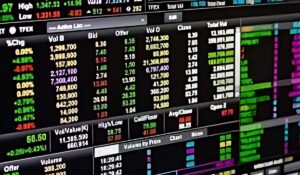The world of finance is always in flux, with new innovations and changes shaping the way we invest, trade, and manage our wealth. One of the most exciting developments in recent years is the emergence of the yotsuba stock exchange (YSE), a platform that has rapidly gained attention for its innovative approach to trading and its potential to revolutionize global financial markets. In this article, we will delve into what the Yotsuba Stock Exchange is, its unique features, and how it is positioned to impact the future of trading.
What is the Yotsuba Stock Exchange?
The Yotsuba Stock Exchange, commonly referred to as YSE, is a digital stock exchange that operates on a global scale. Launched recently, YSE has quickly become a focal point for traders and investors who are looking for a modern, efficient, and secure platform to trade a wide range of assets. Unlike traditional stock exchanges, which are often tied to specific geographic locations and operate during set hours, YSE offers a 24/7 trading environment, allowing participants from around the world to trade at any time.
YSE’s name is derived from the Japanese word “Yotsuba,” meaning “four-leaf clover,” symbolizing luck and prosperity. This name reflects the exchange’s mission to bring fortune to its users through cutting-edge technology and innovative financial products.
Key Features of YSE
Yotsuba Stock Exchange stands out from other exchanges due to several unique features that cater to modern traders and investors. Here are some of the key aspects that make YSE a compelling platform:
- 24/7 Trading: One of the most significant advantages of YSE is its round-the-clock trading availability. Unlike traditional exchanges that operate within fixed hours, YSE allows traders to buy and sell assets at any time, regardless of their location. This flexibility is especially beneficial for global investors who want to react to market changes in real-time without being restricted by time zones.
- Blockchain Technology: YSE leverages blockchain technology to enhance transparency, security, and efficiency in trading. All transactions on the platform are recorded on a decentralized ledger, ensuring that they are tamper-proof and verifiable. This use of blockchain not only reduces the risk of fraud but also lowers the cost of transactions by eliminating the need for intermediaries.
- Diverse Asset Offering: YSE offers a wide range of assets for trading, including traditional stocks, cryptocurrencies, commodities, and more. This diverse offering allows investors to diversify their portfolios and explore new investment opportunities. Moreover, YSE plans to introduce tokenized assets in the future, enabling fractional ownership of real-world assets such as real estate and art.
- AI-Powered Trading Tools: YSE provides traders with advanced tools powered by artificial intelligence (AI). These tools analyze market trends, predict price movements, and generate trading signals, helping traders make informed decisions. The AI algorithms are designed to learn and adapt over time, continually improving their accuracy and effectiveness.
- Low Fees: One of the major draws of YSE is its low transaction fees. By leveraging blockchain technology and cutting out intermediaries, YSE can offer competitive fees that are significantly lower than those of traditional exchanges. This cost advantage makes YSE an attractive option for both retail and institutional investors.
- Global Accessibility: YSE is designed to be accessible to everyone, regardless of their location or financial background. The platform supports multiple languages and currencies, making it easy for users from different countries to participate in the global financial markets. Additionally, YSE has partnered with various payment providers to offer seamless deposit and withdrawal options.
How YSE is Disrupting Traditional Stock Exchanges

The introduction of YSE has sent ripples through the financial industry, as it challenges the dominance of traditional stock exchanges. Here’s how YSE is disrupting the status quo:
- Decentralization: Traditional stock exchanges are typically centralized, with a single entity controlling the trading process. In contrast, YSE operates on a decentralized model, where transactions are processed and verified by a network of nodes. This decentralization not only enhances security but also makes the exchange more resilient to outages and cyberattacks.
- Inclusivity: YSE’s global reach and low fees make it more inclusive than traditional exchanges. Retail investors who were previously excluded from certain markets due to high fees or geographic limitations can now participate on an equal footing with institutional investors. This democratization of access is a significant shift in the financial landscape.
- Speed and Efficiency: The use of blockchain and AI allows YSE to process transactions faster and more efficiently than traditional exchanges. Trades on YSE are settled almost instantly, eliminating the need for the lengthy clearing and settlement processes that are common in traditional markets. This speed is particularly advantageous for high-frequency traders who rely on rapid execution to capitalize on market movements.
- Innovation in Financial Products: YSE is at the forefront of innovation when it comes to financial products. The introduction of tokenized assets and AI-driven trading tools opens up new possibilities for investors. For example, the ability to trade fractional shares of expensive assets makes investing more accessible to a broader audience.
- Regulatory Challenges: While YSE’s innovative approach offers numerous benefits, it also presents challenges, particularly in terms of regulation. Traditional stock exchanges operate under strict regulatory frameworks that vary by country. YSE, with its global reach and decentralized nature, must navigate a complex web of regulations to ensure compliance. The exchange’s success will depend on its ability to work with regulators while maintaining its core principles of transparency and accessibility.
The Future of YSE and Global Financial Markets
The Yotsuba Stock Exchange is still in its early stages, but it has already shown immense potential to reshape the financial industry. As more traders and investors flock to the platform, YSE is likely to continue growing and evolving. Here are some potential developments to watch for in the future:
- Expansion of Asset Classes: YSE’s commitment to offering a diverse range of assets will likely lead to the introduction of new asset classes, including tokenized assets and derivatives. This expansion will provide investors with even more opportunities to diversify their portfolios and explore alternative investments.
- Integration with DeFi: Decentralized Finance (DeFi) is a rapidly growing sector that offers financial services without traditional intermediaries. YSE could integrate with DeFi platforms to offer lending, borrowing, and staking services, further enhancing its value proposition for users.
- Partnerships with Traditional Financial Institutions: As YSE gains traction, it may seek partnerships with traditional financial institutions to bridge the gap between the old and new financial systems. Such partnerships could involve the integration of YSE’s technology into existing financial infrastructure, enabling seamless cross-platform trading.
- Increased Regulatory Scrutiny: As YSE continues to grow, it will inevitably attract the attention of regulators around the world. The exchange will need to navigate the regulatory landscape carefully, balancing the need for compliance with its mission of decentralization and accessibility.
- Adoption of AI and Machine Learning: YSE’s AI-powered trading tools are just the beginning. In the future, we can expect the exchange to adopt even more advanced AI and machine learning technologies to enhance trading strategies, risk management, and market analysis.
- User Education and Support: To ensure that all users can fully leverage the platform’s capabilities, YSE may invest in educational resources and support services. These initiatives could include webinars, tutorials, and customer support teams to help users navigate the platform and make informed investment decisions.
Most Searched FAQs About the Yotsuba Stock Exchange
- What is the Yotsuba Stock Exchange?
- The Yotsuba Stock Exchange (YSE) is a global digital stock exchange that operates 24/7, allowing traders to buy and sell various assets such as stocks, cryptocurrencies, and commodities using blockchain technology.
- How does the Yotsuba Stock Exchange work?
- YSE operates on a decentralized blockchain platform, where transactions are recorded on a distributed ledger. This ensures transparency, security, and faster settlement times compared to traditional stock exchanges.
- What assets can I trade on the Yotsuba Stock Exchange?
- YSE offers a diverse range of assets, including traditional stocks, cryptocurrencies, commodities, and plans to introduce tokenized assets such as real estate and art in the future.
- Is the Yotsuba Stock Exchange regulated?
- YSE is navigating a complex regulatory landscape due to its global and decentralized nature. It is working with regulators to ensure compliance while maintaining its core principles of transparency and accessibility.
- What are the trading fees on Yotsuba Stock Exchange?
- YSE offers low transaction fees by leveraging blockchain technology, making it cost-effective for both retail and institutional investors.
- Can I trade on the Yotsuba Stock Exchange from any country?
- Yes, YSE is designed to be globally accessible, supporting multiple languages and currencies, allowing users from different countries to trade seamlessly.
- What makes the Yotsuba Stock Exchange different from traditional stock exchanges?
- Unlike traditional exchanges, YSE operates 24/7, uses blockchain technology for secure and fast transactions, and offers AI-powered trading tools. It also provides access to a wider range of assets, including cryptocurrencies and tokenized assets.
- How do I start trading on the Yotsuba Stock Exchange?
- To start trading on YSE, you need to create an account on their platform, complete the necessary verification processes, deposit funds, and you’re ready to trade. YSE supports various payment methods for easy deposits and withdrawals.
- What are tokenized assets on the Yotsuba Stock Exchange?
- Tokenized assets on YSE are real-world assets like real estate or art that are divided into digital tokens, allowing investors to purchase fractional ownership. This makes investing in expensive assets more accessible.
- How does Yotsuba Stock Exchange ensure the security of transactions?
- YSE uses blockchain technology, where all transactions are recorded on a decentralized ledger that is tamper-proof and verifiable. This ensures high levels of security and reduces the risk of fraud.
- Does Yotsuba Stock Exchange offer customer support?
- Yes, YSE offers customer support to assist users with trading, account management, and other inquiries. They may also provide educational resources such as webinars and tutorials.
- What is the role of AI in the Yotsuba Stock Exchange?
- AI is integrated into YSE to provide traders with advanced tools for market analysis, trend prediction, and trading signals, helping users make informed decisions and improve their trading strategies.
- Can I trade cryptocurrencies on the Yotsuba Stock Exchange?
- Yes, YSE supports cryptocurrency trading along with traditional stocks and other assets, offering a wide range of investment opportunities.
- How fast are transactions settled on the Yotsuba Stock Exchange?
- Due to its use of blockchain technology, transactions on YSE are settled almost instantly, eliminating the delays associated with traditional stock exchanges.
- What is the future of the Yotsuba Stock Exchange?
- YSE is expected to continue expanding its asset offerings, integrating with DeFi platforms, adopting more advanced AI technologies, and potentially forming partnerships with traditional financial institutions.
Conclusion
The Yotsuba Stock Exchange represents a new era in global financial markets. With its innovative features, global accessibility, and commitment to decentralization, YSE has the potential to revolutionize the way we trade and invest. While there are challenges ahead, particularly in terms of regulation, the future looks bright for YSE and its users. As the platform continues to grow and evolve, it will be exciting to see how it shapes the future of finance.









